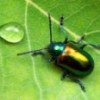Achenbach, A., Foitzik, S. 2009. FIRST EVIDENCE FOR SLAVE REBELLION: ENSLAVED ANT WORKERS SYSTEMATICALLY KILL THE BROOD OF THEIR SOCIAL PARASITE PROTOMOGNATHUS AMERICANUS . Evolution, Online Early, doi: 10.1111/j.1558-5646.2009.00591.x
Abstract: During the process of coevolution, social parasites have evolved sophisticated strategies to exploit the brood care behavior of their social hosts. Slave-making ant queens invade host colonies and kill or eject all adult host ants. Host workers, which eclose from the remaining brood, are tricked into caring for the parasite brood. Due to their high prevalence and frequent raids, following which stolen host broods are similarly enslaved, slave-making ants exert substantial selection upon their hosts, leading to the evolution of antiparasite adaptations. However, all host defenses shown to date are active before host workers are parasitized, whereas selection was thought to be unable to act on traits of already enslaved hosts. Yet, here we demonstrate the rebellion of enslaved Temnothorax workers, which kill two-thirds of the female pupae of the slave-making ant Protomognathus americanus. Thereby, slaves decrease the long-term parasite impact on surrounding related host colonies. This novel antiparasite strategy of enslaved workers constitutes a new level in the coevolutionary battle after host colony defense has failed. Our discovery is analogous to recent findings in hosts of avian brood parasites where perfect mimicry of parasite eggs leads to the evolution of chick recognition as a second line of defense.
- Log in to post comments

Is this the first time something like this has ever been recorded?
As far as I know, yes.
I know from my own experience trying to rear them, that occasionally in captive colonies of formicine "slave-makers", the social order breaks down and the host workers kill off the parasite's brood and even the queen. An interesting thing about natural populations of "slavemaking" ants, is that they often appear to be isolated from one another by large areas occupied only be unparasitized host species colonies. One wonders if host populations are repeatedly evolving away from susceptibility to "enslavement".
I can't seem to access the article, but this study may be unique in that it describes a phenomenon in a natural population.
James,
Yes, you may remember we reported in our Polyergus paper that the Formica workers of all three species exhibited very high levels of aggression towards Polyergus queens (often, eventually leading to her death). This was apparent from day 1 after they were brought into the lab. In dulotic ants, worker aggression toward queens would be another mechanism operating after parasitization, so this is perhaps not the first time that "post-parasititization" selection for colony defense (slave rebellion) has been observed, but it is probably the first demonstration of slave rebellion of this particular kind.
Josh